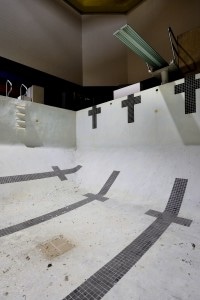Andrew Feiler describes himself as a management consultant and fifth generation Georgian who facilitates strategic planning with non-profit and for-profit clients.He grew up in Savannah attending a private school from K-12. His parents were both outspoken liberals in the third oldest Jewish congregation in America known as Mikve Israel where his mother became the first female president. His father wrote his college thesis on affordable housing models, and then moved to Savannah in 1959, went into business with Andrew’s grandfather and proceeded to build the Feiler Park development, which exists to this day.
His mother was an arts educator who engaged her son from an early age in finger paints and other media while explaining about color, light, focal point, etc. His early influences in art were Edward Hopper for his use of light, Picasso for his formalism and structure and Louise Nevelson for her use of the monochromatic. Andrew began experimenting with photography in middle school using a Kodak Instamatic Camera; his parents were supportive of his early efforts and even framed one of his instamatic images.
Andrew spent many years traveling and educating himself around the world, completing a graduate degree in American History from Oxford University and an MBA from Stanford. He also photographed 61 countries before returning to Atlanta to live in 1995.
The south called him back and he has never regretted in; in fact he feels that his new work is not only the most personal but also, his best. All of his experiences in his southern childhood, his family’s involvement in community engagement, and the Jewish tradition of storytelling have come together in various bodies of work that can be seen on Andrew’s website. The first group that caught my eye is the series “Blacks and Whites”.

Blacks and Whites are not black and white images, nor are they images of black and white people and they’re not color photos with only black and white elements, but something else again. Andrew explains, “in the south almost everything is seen through the prism of race and civil rights…our community functions in spaces that are predominantly either black or white, such as in churches…but there are certain spaces in the town square where everyone does come together”. In these places Andrew looks for strong black and white visual elements to “illustrate this fundamental fact of how race plays itself out in our cities”. The works are very graphic and visually appealing.
Brighten a corner where you are consists of highly saturated photos depicting “color playing a deliberate role in a man-made environment”. “In the Renaissance pigments were rare and very pricey, it’s only been a short time in human history since man could control the color in his world”, Andrew says. “Color does a lot of deliberate things, it attracts, disguises and it says: look at me!” While simultaneously playful and engaging, the portfolio is also stunningly graphic.

Andrew’s latest work involves the documentation of Morris Brown College—a historic black college in Atlanta that, due to financial reasons in 2002 had been forced to close and sell off. Historically black colleges and universities (HBCU’s) have played a prominent role in Atlanta attracting some of the best national draws from the entire country. There are 100 HBCU’s left in the country representing only 3% of all colleges in America but they play a huge role in the lives of African-American higher education.
10% of all African-Americans who go to college attend HBCU’s and more than 25% of all African-Americans who earn degrees get them at HBCU’s! The schools are essential to bringing African-Americans into the American dream and into the middle class of America; the closing of one of these schools was “a hugely important story” to Andrew and “worthy of his exploration”. Due to his work with non-profits Andrew was lucky to have the acquaintance of leaders in the civil rights movement who were able to put him in touch with the vice chairman of Morris Brown who warmly embraced his exploration.

Three years later Andrew has published a book, Without Regard to Sex, Race, or Color (University of Georgia Press, 2015) about the closing of the school and is working with college administrators to raise the schools profile in an effort to buy it back.
http://www.andrewfeiler.com/
